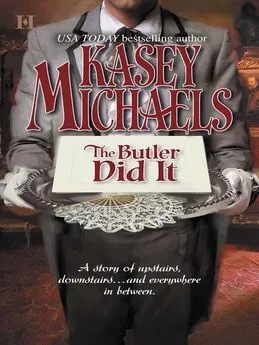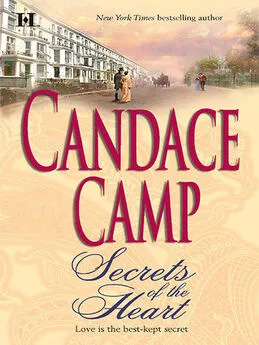Кейси Майклс - The Secrets of the Heart
- Название:The Secrets of the Heart
- Автор:
- Жанр:
- Издательство:неизвестно
- Год:неизвестен
- ISBN:нет данных
- Рейтинг:
- Избранное:Добавить в избранное
-
Отзывы:
-
Ваша оценка:
Кейси Майклс - The Secrets of the Heart краткое содержание
The Secrets of the Heart - читать онлайн бесплатно ознакомительный отрывок
Интервал:
Закладка:
“And what about Undercliff?” Sir Gladwin asked, shifting slightly in his chair. “Symington isn’t in this alone. I still can’t picture it—Undercliff dabbling in trade.”
“Neither can I,” St. Clair agreed. “I’d have given a hefty sum to have been present when dear Gertie recovered sufficiently from her indelicate swoon to begin ripping strips off his lordship’s hide.”
“Yes, it must have been a jolly good ruckus,” Lord Osgood chimed in.
“But, be that as it may, my friends,” Sir Gladwin persisted mournfully, “we’re now left in the uncomfortable position of knowing we are attacking a fellow peer when we attack the Symington mills. The Peacock’s reputation as a rascal to be admired might suffer an irreparable dent if Society were to understand that, besides tweaking the mill owners and our dear nemesis, Sidmouth, he is also dipping a hand into the pockets of one of their own.”
George tried to hide a wince as he saw a steely look come into Christian’s eyes, and he hastened into speech. “Now, Winnie, you know the Peacock doesn’t exist for the titillation of Society. We have a mission, a serious mission. People are suffering untold horrors, and it is our duty to bring their plight to Society’s attention. Isn’t that right, Ozzie?”
“Never said it couldn’t be fun,” Lord Osgood grumbled into his glass, avoiding everyone’s eyes. “Besides, Kit tried it the other way, being hangdog serious and all in his single speech to the Lords, and look what it got him. Roasted the fella to a turn. Ain’t that right, Kit?”
St. Clair smiled at his friend. “Please, Ozzie, it isn’t polite to remind me of my debacle. That was so long ago, and the incident has luckily faded from most minds. Disappearing back into the countryside was the best thing I could do at the time, and my years in Paris proved a boon. No one remembers the Johnny Raw I was when they are being dazzled by the exquisite I have become.”
“And there’s not a man jack of them who wouldn’t fall to the floor, convulsed in hysterics, if anyone was to say you was the Peacock,” Sir Gladwin added. “Still, with everyone in town so hot to discover the Peacock’s identity, I can’t help but worry.”
“Good, Winnie,” St. Clair said, grinning. “You worry. Both you and Grumble do it very well.” Then, sobering, he turned to George to ask, “What did we get for Symington’s coach?”
George allowed himself to relax for a moment, happy to act in his role of St. Clair’s loyal “lieutenant” of sorts. He saw himself as the man who managed all the details of heroism or, as he was wont to think, played the part of crossing sweep, clearing Christian’s path of the mundane, and then going a step further, following after him with a sturdy broom, managing the consequences of his friend’s grandiose schemes.
It had been thus since their childhood: Kit dreaming up mad adventures and George making sure they had meat pies tucked up in their pockets before they ventured out for an afternoon of dragon slaying.
“Sufficient to buy twenty dozen pairs of clogs for the children in and around Little Pillington,” he told St. Clair, “and with enough left over to have weekly deliveries of bread to the town square for three months, deliveries I’ve already arranged. I didn’t sell the horses, though. They’re being ridden north by Symington’s coachman and groom, to the Midlands, where they can be of use to some of the few farmers still left on their land. All in all, Kit, a good night’s work, even if we didn’t have sufficient time to salvage much from that grotesque castle before we heard you coming and had to torch the place. It’s a shame Symington couldn’t stay later at his party.”
“I doubt Symington makes a pleasant guest. His host must have intelligently called for evening prayers an hour early, then quite happily waved dear Herbert on his way,” St. Clair commented, reaching into his pocket to draw out a scrap of paper. “Good work, George, as usual. I commend you. However, I received rather disconcerting news a few hours ago from our connection in Little Pillington.”
“What is it?” Lord Osgood asked, leaning forward as if to read the note himself.
“A hapless mill worker by the name of Slow Dickie was apprehended last night, lurking about somewhere in the area of Symington’s burnt mansion,” Christian told them, crushing the note into a ball and flinging it into the fire. “No one could say he was stealing, as they found nothing on him save a rather bedraggled peacock feather. So sad. I had imagined Symington saving the thing and perhaps having it preserved beneath a glass dome on his mantel. But that is beside the point. This Slow Dickie fellow is to be publicly whipped for trespass. We can’t have that, gentlemen.”
“Any suggestions?” George asked quickly, looking to the two other men, hoping to see some sign that either of them shared his growing unease. Or was he, George Trumble, the only one among them who saw what was happening?
More than a year before, Christian had brought his three oldest friends into his scheme to tweak both Lord Sidmouth’s and the communal Tory nose while bringing aid and comfort to the downtrodden at the same time. But what had been initiated for all the best intentions had begun to turn dangerous these past six months, not only for themselves, but for those downtrodden masses as well. Poor, hopeless, hopeful men like this Slow Dickie person, for one. Perhaps such insight was beyond Ozzie and Winnie. But didn’t Christian see what was happening?
Or was the proud Christian too consumed with avenging old grudges, with getting some of his own back from those who had scorned him, to recognize when enough was enough?
Although, in the beginning, Christian had been brilliant. If St. Clair’s fire-breathing, well-intentioned speech to the House of Lords all those years before had done little else, it had proven to him that the comfortable few were not about to put themselves out for the masses. George could still recall that inglorious day and the Member who had called out jeeringly, “Regulate the mill owners? Did you hear that? Next he’ll be taking up the Irish cause! Shout him down, my lords. Shout the seditious rascal down!”
St. Clair, George remembered, had been devastated by his first real defeat. A young man of means, with both wealth and privilege carved out by his forefathers and given to him as his birthright, St. Clair, who had helplessly watched Lord Sidmouth’s actions from the sidelines for several years, was convinced that he had been gifted with the money, the talent, and the courage to right the wrongs done the displaced farmers, turned-off soldiers, and exploited mill workers.
From the time they had been children together in Kent, George had known that Christian would always be a man with a mission, a man imbued with his father’s courage and his mother’s soft, caring heart. All Christian lacked was the power to convince his fellow peers of the folly of keeping their collective government heel on the peasantry’s collective neck. Taking his fight against exploitative mill owners, repressive Corn Laws, and other inequities to Parliament after Wellington’s soldiers returned to England to be met with high prices and no source of employment had been just the sort of thing the hotheaded St. Clair had deemed “reasonable.”
But, after his speech, the younger Christian had immediately been branded persona non grata in a society that did not appreciate having a mirror held up to its shortcomings. As he had told George when the two old friends had gotten woefully drunk that same night to commemorate Christian’s political debacle, he now knew that his would be a lone voice in the wilderness if he continued to be a firebrand for his unpopular causes.
But what could Christian do? He could, of course, give away his vast fortune to those less fortunate and earn himself the mantle of martyr, but he could do that only once, and the problem would not be solved.
As Christian had seen it, there was nothing else for it than that he should change his strategy. He had retired to Kent for a space to lick his wounds and anonymously set up charities George agreed to administer for him.
He had then departed alone for the glittering court of postwar France, stopping first in Calais to visit with a bitter but still brilliant Beau Brummell, trading dinners and gifts of wine for tidbits of helpful information on the exploitable weaknesses of Society from the acknowledged master of manipulation.
Once in Paris, that centuries-old hotbed of intrigue, Christian learned how even a young, brash, somewhat abrasive lad from the country could use the arts and cultured airs of the sophisticated gentleman to succeed where determination and belligerent indignation had failed.
The Baron Christian St. Clair who had finally returned to London was barely recognizable as being the same angry young fellow who had been in Society’s orbit for scarcely a sennight two Seasons earlier, for this Baron Christian St. Clair was exquisitely dressed, beautifully mannered, and a constant source of delight to both the gentlemen and their ladies.
To those he now enchanted, the baron was an elegant fop whose presence at any party was to be considered a social coup, a deep-in-the-pockets dandy with delicious notions as to fashion, an amusing dinner companion, and a clear favorite with the eligible debutantes and their doting mamas.
In short, George thought now with a wry smile, within the space of the first few weeks of his triumphant return to the city of his great embarrassment, Christian had wrought a veritable miracle, replacing the departed Beau Brummell as the most dazzling light in the glittering world of a ton eager to discover and then worship at the shrine of another dashing figure of manners and fashion.
Never giving up his private charitable contributions on behalf of the mill workers and other poor souls, Christian had begun to implement his influence with Society through wit and humor and his immense social consequence, tweaking them into awareness of the terrible problems that plagued England without them ever knowing he was doing it.
And the method of his enlightenment bordered on pure genius.
Letters to the London newspapers, eloquent, beautifully written letters, told of the terrible injustices of Sidmouth’s government, informing, educating, but without preaching. Each missive arrived at the newspaper offices accompanied by a single peacock feather, causing the interested but not very original publishers to dub their unknown contributor the Peacock.
While enjoying the social round, St. Clair made it a point to comment favorably on the concerned soul who was penning the letters. From that moment on it became de rigueur for all those in the ton to read these letters, even to commit the most affecting passages to memory in order to recite them at parties.
Every week another communication was published. Each related a sad tale of a despondent mother forced to sell her young son to a chimney sweep, or spoke of an old woman found starved to death in an alleyway, or profiled a father of ten incarcerated for debt and denied habeas corpus because he could not afford £25 for a lawyer.
The Peacock’s story of the plight of a crippled soldier—a man once seen fighting by the side of the Iron Duke at Salamanca—who had been caught stealing the piddling amount of five shillings’ worth of bacon, then sentenced to death because he was “undermining the whole structure of a free society and was not fit to live,” had been rumored to have reduced the Queen herself to tears.
One other particular column had caused quite a stir throughout Mayfair, with a rich and pampered Society lining up on either side of the issue as to whether or not a hapless youth should be hanged for chipping the balustrade of Westminster Bridge!
Читать дальшеИнтервал:
Закладка:










